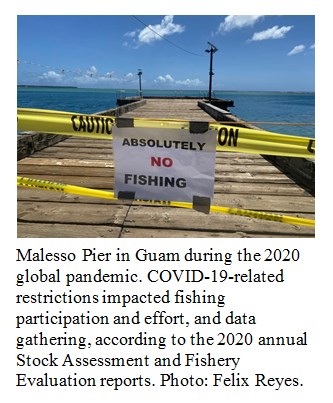News and Announcements
Press Release – Western Pacific Scientists Support Fishermen Input on Annual Reports, Gear Requirements to Protect Sharks (17 June 2021)
 HONOLULU (17 June 2021) The SSC supported inclusion of a new section on fishermen observations to the annual status of the fisheries regional and pelagic reports for American Samoa, Guam, the Commonwealth of the Northern Mariana Islands (CNMI), Hawai‘i and the Pacific Remote Island Areas. The Scientific and Statistical Committee (SSC) of the Western Pacific Regional Fishery Management Council discussed this and other issues during its three-day virtual meeting this week.
HONOLULU (17 June 2021) The SSC supported inclusion of a new section on fishermen observations to the annual status of the fisheries regional and pelagic reports for American Samoa, Guam, the Commonwealth of the Northern Mariana Islands (CNMI), Hawai‘i and the Pacific Remote Island Areas. The Scientific and Statistical Committee (SSC) of the Western Pacific Regional Fishery Management Council discussed this and other issues during its three-day virtual meeting this week.Fishermen contributions to the 2020 Stock Assessment and Fishery Evaluation (SAFE) reports provided important input in light of COVID-19-related restrictions on data gathering, and real in-water experiences that cannot be replicated by federally funded science.
Bottomfish catch, effort and participation generally declined for all areas except for CNMI in 2020 relative to historical averages, with impacts due to the COVID-19 pandemic likely being a contributing factor. In addition, there was a severe reduction in fishery-dependent sampling, especially in Guam, where nearly half of the scheduled creel catch interviews for the year were not conducted due to social distancing restrictions.
The Council produces the SAFE reports through contributions of data and analyses from local and federal partners. The reports give a snapshot of fishery performance and include oceanic and climate indicators, such as increasing sea surface temperature, which contributes to local mass mortality events for coral.
—
The SSC supported options for bigeye tuna longline catch and allocation limits for 2022 of either up to 3,000 metric tons (6.6 million pounds) or 6,000 metric tons (13.2 million pounds) total transfers for the U.S. Participating Territories of American Samoa, Guam and the CNMI. This recommendation is based on a 2020 assessment for the Western and Central Pacific Ocean (WCPO) that indicated the bigeye tuna stock is healthy—not subject to overfishing or overfished.
In accordance with applicable laws, the Council may recommend a quota for each U.S. territory and may allow transfer of part of its quota through specified fishing agreements. These agreements are negotiated once the U.S. quota (3,554 metric tons in 2020) is reached.
—
A new risk analysis from the Pacific Islands Fisheries Science Center found that a longline fishery gear change by the Hawai‘i deep-set fleet from wire to monofilament leaders would reduce the catch and mortality of oceanic whitetip sharks by about 30%. If a ban on wire leaders was implemented at the international level under regional fishery management organizations, it would reduce the species mortality by 35% across the region.
The SSC finds that the available scientific information provides support for prohibiting wire leaders in longline fisheries and requiring removal of trailing gear from accidentally hooked species like threatened oceanic whitetip sharks. The Council is considering a regulatory change to improve post-hooking survivorship of oceanic whitetip sharks that are listed as threatened under the Endangered Species Act and is subject to overfishing and overfished in the WCPO. Science also provides support for removing as much trailing gear as possible, including the weighted swivel. The SSC recommended that the Council continue to work with the National Marine Fisheries Service and the fishing industry to research methods and practices to facilitate additional safety measures to prevent fly-back.
The SSC also recognized the importance of addressing fishery impacts to oceanic whitetip sharks at the international level due to the small relatively impact from U.S. longline fleets.
—
The SSC heard a presentation on a 2020 study that scored 95 U.S. fisheries with respect to bycatch using a “relative bycatch index.” Results from the analysis could potentially be used to facilitate management intervention strategies for particular fisheries or gear types, such as shrimp and otter trawls and several pelagic longline and gillnet fisheries, which had the poorest bycatch performance. These findings underscore the need for continued, high-quality, easily accessible bycatch information to better support fisheries management in the United States and globally. The Hawai‘i deep-set longline fishery had a relatively high index value as compared to the shallow-set and American Samoa longline fisheries. However, the SSC noted that the study did not take into account regional differences in bycatch strategies and criteria weighting.
Recommendations made by the SSC on these and other matters will be considered by the Council when it meets June 22-24, 2021, virtually with host sites at Tedi of Samoa Building, Suite 208B, Fagatogo Village, American Samoa; BRI Building, Suite 205, Kopa Di Oru St., Garapan, Saipan, Commonwealth of the Northern Mariana Islands (CNMI); and Cliff Pointe, 304 W. O’Brien Dr., Hagatña, Guam.
Instructions on connecting to the web conference, agendas and briefing documents are posted at www.wpcouncil.org/meetings-calendars. Host sites are subject to local and federal safety and health guidelines regarding COVID-19; check the Council website for updates.
